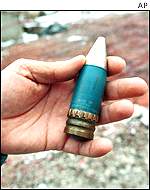
A team of German doctors and scientists is expected in Serbia this week to carry out tests in the southern region of Vranje where Nato used depleted uranium weapons during its bombing campaign in 1999.
The team will collect urine samples from 500 people living in the area and take them to Germany and Canada for analysis.
 Many weapons that used uranium are just lying around
|
According to the Yugoslav army, Nato warplanes dropped some 1.5 tons of depleted uranium onto the territory of Yugoslavia, excluding Kosovo.
A Yugoslav army spokesman, Colonel Milenko Rilak, said analyses of the soil from four locations in the vicinity of Vranje showed radioactivity levels of up to 1,000 times higher than the norm.
"All necessary measures are being taken to protect the population and the environment," Colonel Rilak said.
Geiger counters not effective
But environmental groups in Yugoslavia are dissatisfied with the official response to the depleted uranium issue.
They argue that Geiger counters cannot measure radiation from depleted uranium, and want experts to examine samples of water, plant and animal life.
They are also pressing the government to publish detailed maps of the areas where the contentious missiles were used.
"Studies into the effects of depleted uranium started only after a sufficient number of European soldiers died," said Radoje Lausevic, a Yugoslav environmentalist.
"No-one in the west cares how many Serbs or Albanians died of radiation in Kosovo."
Chemical danger
Detailed tests have already been carried out in the north of Serbia, where scientists said their analysis of soil, air, rain-water and foodstuffs showed no indication of increased radiation.
But oncologists from the Belgrade Medical Centre warned that radioactivity was not the only cause for concern.
They said that chemical contamination was probably a greater risk, and its effects would only be seen in a year's time.
"According to our projections, the number of cancer cases will increase by 30% over the next five years," said an oncologist, Danica Bozovic.
"The first victims will be children, we will see leukaemia and other malignant diseases," she added.
Children at risk
Serb doctors in Kosovo maintain that they are already witnessing the impact of the bombing campaign on the health of local people.
Doctors at the Serb-run hospital in Kosovska Mitrovica say the number of patients suffering from malignant diseases has increased by 200% since 1998.
They say they have witnessed a rise in the number of premature births, miscarriages and babies born with severe head deformities.
| Search BBC News Online |
||
Advanced search options | ||
|
| |
|
| |
|
Special report
| ||
|
Key stories
| ||
|
Eyewitness
| ||
| ||
| ||

